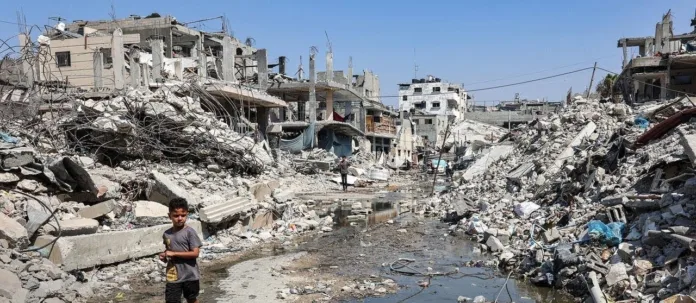As the death toll in Gaza exceeds 40,000, negotiators in Doha seek a breakthrough on a ceasefire and hostage release deal, facing numerous obstacles and low expectations for immediate success
Tensions reached a critical point on August 15, 2024, as high-stakes ceasefire and hostage release negotiations resumed in Doha, Qatar. The talks, involving key international and regional actors, aim to halt the devastating 10-month war between Israel and Hamas, which has claimed over 40,000 Palestinian lives, according to Gaza’s Hamas-run health ministry.
White House spokesperson John Kirby described the start of the new round of discussions as “promising,” yet acknowledged the considerable work still required to bridge gaps in the framework agreement. The talks follow a suspension triggered by the assassination of Hamas leader Ismail Haniyeh in Tehran, an incident that heightened fears of a broader regional conflict involving Iran.
The negotiations in Doha are crucial not only for their immediate impact on the Gaza conflict but also for their potential to prevent a wider war that could draw in Iran and its proxy forces. Despite the urgency, expectations for a breakthrough remain tempered. Hamas has declined to participate directly in the talks but is reportedly receiving messages from mediators.
Israeli media have indicated that Israel’s negotiating team has received an expanded mandate, reflecting the complexities of the current discussions. Key sticking points include control over the Philadelphi corridor, a strip of land along Gaza’s southern border with Egypt, and the return of displaced Palestinian civilians to northern Gaza.
Hamas has accused Israel of introducing new conditions to the negotiations, including demands for continued control over the Philadelphi corridor and screening of displaced individuals returning to northern Gaza. Israeli Prime Minister Benjamin Netanyahu’s office has denied these claims, asserting that the new terms are essential clarifications rather than new demands.
The first phase of the proposed agreement, outlined by U.S. President Joe Biden, involves a full ceasefire lasting six weeks, the withdrawal of Israeli forces from populated areas in Gaza, and an exchange of hostages, including women, the elderly, and the sick, for Palestinian prisoners held by Israel. Subsequent phases include the release of all remaining hostages, a permanent end to hostilities, and a major reconstruction plan for Gaza.
Israeli military sources report that over 17,000 “terrorists” have been eliminated, while the conflict has also resulted in the deaths of 330 Israeli soldiers. The humanitarian crisis in Gaza continues to escalate, with significant destruction reported across nearly 60% of the territory’s buildings.
The delegation in Doha includes prominent figures such as Israeli Mossad Director David Barnier, Shin Bet Director Ronen Bar, and Israeli military hostage chief Nitzan Alon, alongside CIA Director William Burns, Qatari Prime Minister Mohammed bin Abdul Rahman Al Thani, and Egyptian intelligence chief Abbas Kamel. Their combined efforts are focused on navigating the complex and contentious issues at the heart of the negotiations.
The talks also face the challenge of addressing the broader regional implications. Iran, which has vowed retaliation for the assassination of Haniyeh, poses a significant threat to the stability of the region. The Israeli military has warned Iran of severe consequences for any aggression, while Iran maintains that a punitive response is justified.
Analysis:
Political: The resumption of ceasefire talks in Doha underscores the high political stakes involved in resolving the Gaza conflict. The Biden administration’s active role in mediating the discussions reflects its strategic interest in preventing a regional war and demonstrating U.S. leadership on the global stage. The involvement of senior officials from Israel, the U.S., and key regional players highlights the complex geopolitical dynamics at play. The negotiations also illustrate the delicate balance required to manage domestic political pressures and international diplomatic relationships.
Social: The ongoing war and the associated humanitarian crisis have deeply impacted global public opinion. The rising death toll in Gaza and the plight of hostages have galvanized calls for immediate action from various social groups. Families of hostages and displaced Palestinians have voiced their desperation and hope for a resolution. The conflict’s portrayal in the media and the response from international organizations reflect broader societal concerns about human rights and the need for effective conflict resolution.
Racial: The Gaza conflict’s impact extends to racial and ethnic communities worldwide, particularly those with strong connections to the Middle East. The humanitarian crisis has resonated with Arab and Muslim communities, who have called for greater international intervention and support. The negotiation process and the associated media coverage reflect the intersection of global conflict with racial and ethnic identities, highlighting the need for inclusive and sensitive approaches to conflict resolution.
Gender: While the conflict itself does not directly address gender issues, the involvement of prominent female figures in the diplomatic efforts reflects the growing role of women in international negotiations. The participation of women in high-level discussions underscores their contributions to shaping global policies and addressing complex crises.
Economic: The potential escalation of the Gaza conflict has significant economic implications, including potential disruptions to regional stability and global markets. The negotiations aim to address these economic concerns by stabilizing the region and preventing a broader war. The proposed reconstruction plan for Gaza also highlights the economic dimensions of post-conflict recovery and the importance of addressing both immediate humanitarian needs and long-term rebuilding efforts.
